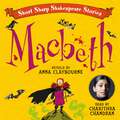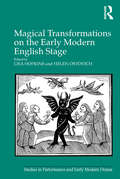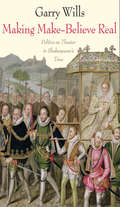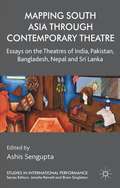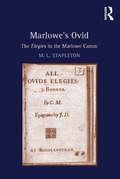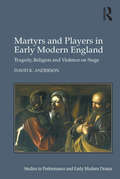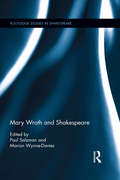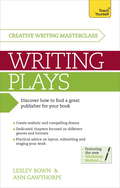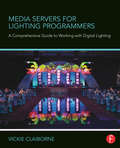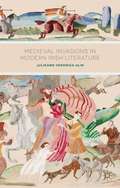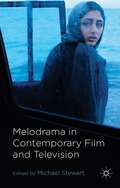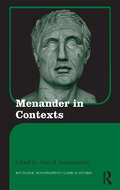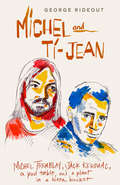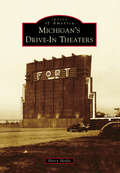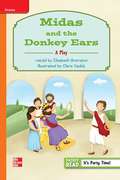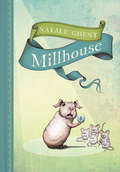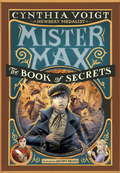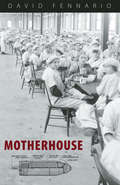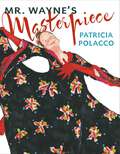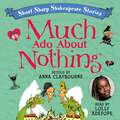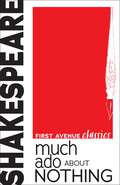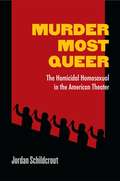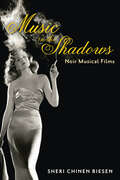- Table View
- List View
Macbeth (Short, Sharp Shakespeare Stories #25)
by Anna ClaybourneIs this a dagger which I see before me...?A power-hungry general, his crazed wife, three interfering witches and some terrifying ghosts... Listen on, through murder and mayhem, to discover the gripping story of Macbeth, one of Shakespeare's most famous tragedies.As well as the story, this audiobook contains information about the background to Macbeth, its major themes, language, and Shakespeare's life during the time he was writing the play. Witches and witchcraft in 16th century England are also examined, to give the context in which the play was written. The Short, Sharp Shakespeare series consists of six books that retell Shakespeare's most famous plays in modern English. Fun sound effects and atmospheric music accompany each narration, making them a great introduction to "the Bard" for children.(P) 2023 Hodder & Stoughton Limited
Magical Transformations on the Early Modern English Stage (Studies in Performance and Early Modern Drama)
by Lisa Hopkins Helen OstovichMagical Transformations on the Early Modern Stage furthers the debate about the cultural work performed by representations of magic on the early modern English stage. It considers the ways in which performances of magic reflect and feed into a sense of national identity, both in the form of magic contests and in its recurrent linkage to national defence; the extent to which magic can trope other concerns, and what these might be; and how magic is staged and what the representational strategies and techniques might mean. The essays range widely over both canonical plays-Macbeth, The Tempest, The Winter’s Tale, The Merry Wives of Windsor, Doctor Faustus, Bartholomew Fair-and notably less canonical ones such as The Birth of Merlin, Fedele and Fortunio, The Merry Devil of Edmonton, The Devil is an Ass, The Late Lancashire Witches and The Witch of Edmonton, putting the two groups into dialogue with each other and also exploring ways in which they can be profitably related to contemporary cases or accusations of witchcraft. Attending to the representational strategies and self-conscious intertextuality of the plays as well as to their treatment of their subject matter, the essays reveal the plays they discuss as actively intervening in contemporary debates about witchcraft and magic in ways which themselves effect transformation rather than simply discussing it. At the heart of all the essays lies an interest in the transformative power of magic, but collectively they show that the idea of transformation applies not only to the objects or even to the subjects of magic, but that the plays themselves can be seen as working to bring about change in the ways that they challenge contemporary assumptions and stereotypes.
Making Make-Believe Real
by Garry WillsShakespeare's plays abound with kings and leaders who crave a public stage and seize every opportunity to make their lives a performance: Antony, Cleopatra, Richard III, Othello, and many others. Such self-dramatizing characters appear in the work of other playwrights of the era as well, Marlowe's Edward II and Tamburlaine among them. But Elizabethan playwrights were not alone in realizing that a sense of theater was essential to the exercise of power. Real rulers knew it, too, and none better than Queen Elizabeth. In this fascinating study of political stagecraft in the Elizabethan era, Garry Wills explores a period of vast cultural and political change during which the power of make-believe to make power real was not just a theory but an essential truth. Wills examines English culture as Catholic Christianity's rituals were being overturned and a Protestant queen took the throne. New iconographies of power were necessary for the new Renaissance liturgy to displace the medieval church-state. The author illuminates the extensive imaginative constructions that went into Elizabeth's reign and the explosion of great Tudor and Stuart drama that provided the imaginative power to support her long and successful rule.
Manonmaneeyam
by P. Sundaram Pillai"Manonmaneeyam" tells us about the harm done by the wicked to the good, and how ultimately the good emerges victorious. This play is unique in the sense that, like English plays, it is divided into Acts and Scenes.
Mapping South Asia through Contemporary Theatre
by Ashis SenguptaWhile remapping the region by examining enduring historical and cultural connections, this study discusses multiple traditions and practices of theatre and performance in five South Asian countries within their specific political and socio-cultural contexts.
Marlowe's Ovid: The Elegies in the Marlowe Canon
by M. L. StapletonThe first book of its kind, Marlowe's Ovid explores and analyzes in depth the relationship between the Elegies-Marlowe's translation of Ovid's Amores-and Marlowe's own dramatic and poetic works. Stapleton carefully considers Marlowe's Elegies in the context of his seven known dramatic works and his epyllion, Hero and Leander, and offers a different way to read Marlowe. Stapleton employs Marlowe's rendition of the Amores as a way to read his seven dramatic productions and his narrative poetry while engaging with previous scholarship devoted to the accuracy of the translation and to bibliographical issues. The author focuses on four main principles: the intertextual relationship of the Elegies to the rest of the author's canon; its reflection of the influence of Erasmian humanist pedagogy, imitatio and aemulatio; its status as the standard English Amores until the Glorious Revolution, part of the larger phenomenon of pan-European Renaissance Ovidianism; its participation in the genre of the sonnet sequence. He explores how translating the Amores into the Elegies profited Marlowe as a writer, a kind of literary archaeology that explains why he may have commenced such an undertaking. Marlowe's Ovid adds to the body of scholarly work in a number of subfields, including classical influences in English literature, translation, sexuality in literature, early modern poetry and drama, and Marlowe and his milieu.
Martyrs and Players in Early Modern England: Tragedy, Religion and Violence on Stage (Studies in Performance and Early Modern Drama)
by David K. AndersonFocusing on Christopher Marlowe, William Shakespeare, John Webster and John Milton, Martyrs and Players in Early Modern England argues that the English tragedians reflected an unease within the culture to acts of religious violence. David Anderson explores a link between the unstable emotional response of society to religious executions in the Tudor-Stuart period, and the revival of tragic drama as a major cultural form for the first time since classical antiquity. Placing John Foxe at the center of his historical argument, Anderson argues that Foxe’s Book of Martyrs exerted a profound effect on the social conscience of English Protestantism in his own time and for the next century. While scholars have in recent years discussed the impact of Foxe and the martyrs on the period’s literature, this book is the first to examine how these most vivid symbols of Reformation-era violence influenced the makers of tragedy. As the persecuting and the persecuted churches collided over the martyr’s body, Anderson posits, stress fractures ran through the culture and into the playhouse; in their depictions of violence, the early modern tragedians focused on the ethical confrontation between collective power and the individual sufferer. Martyrs and Players in Early Modern England sheds new light on the particular emotional energy of Tudor-Stuart tragedy, and helps explain why the genre reemerged at this time.
Mary Wroth and Shakespeare (Routledge Studies in Shakespeare)
by Paul Salzman Marion Wynne-DaviesOver the last twenty five years, scholarship on Early Modern women writers has produced editions and criticisms, both on various groups and individual authors. The work on Mary Wroth has been particularly impressive at integrating her poetry, prose and drama into the canon. This in turn has led to comparative studies that link Wroth to a number of male and female writers, including of course, William Shakespeare. At the same time no single volume has attempted a comprehensive comparative analysis. This book sets out to explore the ways in which Wroth negotiated the discourses that are embedded in the Shakespearean canon in order to develop an understanding of her oeuvre based, not on influence and imitation, but on difference, originality and innovation.
Masterclass: How to create realistic and compelling drama and get your work performed
by Lesley Bown Ann Gawthorpe Lesley HudswellWriting Plays is the invaluable and comprehensive guide to anyone who wants to write plays and get them performed. It covers the basics of the theatre, creating and working with characters, writing realistic speech and dialogue, constructing compelling plots and creating a great ending. There are also separate chapters focused on writing for different genres, including pantomimes, musicals, radio and television. And a final section looks at the practicalities of laying out, submitting and staging your play.
Media Servers for Lighting Programmers: A Comprehensive Guide to Working with Digital Lighting
by Vickie ClaiborneMedia Servers for Lighting Programmers is the reference guide for lighting programmers working with media servers – the show control devices that control and manipulate video, audio, lighting, and projection content that have exploded onto the scene, becoming the industry standard for live event productions, TV, and theatre performances. This book contains all the information you need to know to work effectively with these devices, beginning with coverage of the most common video equipment a lighting programmer encounters when using a media server - including terminology and descriptions - and continuing on with more advanced topics that include patching a media server on a lighting console, setting up the lighting console for use with a media server, and accessing the features of the media server via a lighting console. The book also features a look at the newest types of digital lighting servers and products. This book contains: Never-before-published information grounded in author Vickie Claiborne’s extensive knowledge and experience Covers newest types of digital lighting servers and products including media servers, software, and LED products designed to be used with video Companion website with additional resources and links to additional articles on PLSN
Medieval Invasions In Modern Irish Literature
by Julieann Veronica UlinMedieval Invasions in Modern Irish Literature offers the first book-length treatment of the literary return to and reinterpretation of Giraldus Cambrensis's twelfth century The History of the Conquest of Ireland. Writers studied include W. B. Yeats, Lady Gregory, James Joyce, Sean O'Faol#65533;in, Miche#65533;l Mac Liamm#65533;ir, Brendan Behan and Jamie O'Neill.
Melodrama in Contemporary Film and Television
by Michael StewartMelodrama in Contemporary Film and Television debates the ways in which melodrama expresses and gives meaning to: trauma and pathos; memory and historical re-visioning; home and borders; gendered and queer relations; the family and psychic identities; the national and emerging public cultures; and morality and ethics.
Menander in Contexts: Menander In Contexts (Routledge Monographs in Classical Studies #16)
by Alan H. SommersteinThe comedies of the Athenian dramatist Menander (c. 342-291 BC) and his contemporaries were the ultimate source of a Western tradition of light drama that has continued to the present day. Yet for over a millennium, Menander’s own plays were thought to have been completely lost. Thanks to a long and continuing series of papyrus discoveries, Menander has now been able to take his place among the major surviving ancient Greek dramatists alongside Aeschylus, Sophocles, Euripides and Aristophanes. In this book, sixteen contributors examine and explore the Menander we know today in light of the various literary, intellectual, and social contexts in which his plays can be viewed. Topics covered include: the society, culture, and politics of his generation; the intellectual currents of the period; the literary precursors who inspired Menander (or whom he expected his audiences to recall); and responses to Menander, from his own time to ours. As the first wide-ranging collective study of Menander in English, this book is essential reading for those interested in ancient comedy the world over.
Menander, New Comedy and the Visual
by Antonis K. PetridesThis book argues that New Comedy has a far richer performance texture than has previously been recognised. Offering close readings of all the major plays of Menander, it shows how intertextuality - the sustained dialogue of New Comedy performance with the diverse ideological, philosophical, literary and theatrical discourses of contemporary polis culture - is crucial in creating semantic depth and thus offsetting the impression that the plots are simplistic love stories with no political or ideological resonances. It also explores how the visual aspect of the plays ('opsis') is just as important as any verbal means of signification - a phenomenon termed 'intervisuality', examining in particular depth the ways in which the mask can infuse various systems of reference into the play. Masks like the panchrēstos neaniskos (the 'all-perfect youth'), for example, are now full of meaning; thus, with their ideologically marked physiognomies, they can be strong instigators of literary and cultural allusion.
Michel and Ti-Jean
by George RideoutIn this probing character study, Rideout fashions a hypothetical 1969 meeting in a bar in St. Petersburg, Florida, between Quebec playwright Michel Tremblay and an individual whom he believes to be a truly great writer - beat generation author Jack Kerouac, whose Francophone mother affectionately called him Ti-Jean. At the time of their meeting, Kerouac is forty-seven years old and only months away from death, destroyed by drink in an attempt to live up to the wild image of the "beatnik" stereotype he coined in his novel On the Road. Michel Tremblay is twenty-seven and his first widely produced play, Les Belles Soeurs, has premiered a year before.As he encounters his writing idol, the younger man must break through the older man's emotional barriers to establish common ground. Ultimately, Kerouac's Québécois background helps Tremblay understand his work, recognize the role religion takes, and the place women play in his psyche, as stated metaphorically in the various female characters who populate Les Belles Soeurs.
Michigan's Drive-In Theaters
by Harry SkrdlaFew American phenomena are more evocative of time, place, and culture than the drive-in theater. From its origins in the Great Depression, through its peak in the 1950s and 1960s and ultimately its slow demise in the 1980s, the drive-in holds a unique place in the country's collective past. Michigan's drive-ins were a reflection of this time and place, ranging from tiny rural 200-car "ozoners" to sprawling 2,500-car behemoths that were masterpieces of showmanship, boasting not only movies and food, but playgrounds, pony rides, merry-go-rounds, and even roving window washers.
Midas and the Donkey Ears: A Play [Approaching Level, Grade 3]
by Elizabeth BreretonNIMAC-sourced textbook
Millhouse
by Natale GhentFans of the I, Freddy series and Charlotte's Web will be won over by this charming, delightfully told and illustrated story of a petshop misfit -- a hairless guinea pig with a penchant for Shakespeare. Millhouse is a faint-hearted, hairless guinea pig. A great lover of all things theatrical, most especially the work of William Shakespeare, Milly longs for the limelight and someone to love. However, after the death of his beloved owner, the great actor Sir Roderick Lord Kingswagger, Millhouse is abandoned to a neglected and dusty pet shop filled with other rodents -- some rude, some odd, some cute and some downright frightening. Finding himself a reviled outcast and a target of the nasty Pepper Brown ferret, Millhouse sets about trying to find a way back to the theater and a happy home, and in doing so experiences more drama than he could ever have imagined.
Mister Max: The Book of Secrets
by Cynthia Voigt Iacopo BrunoFrom Newbery Medalist Cynthia Voigt, Book II in the exciting adventures of Mister Max--12-year-old detective in disguise. In Mister Max: The Book of Lost Things, Max Starling proved that he is more than a detective, he's a Solutioneer. His reputation for problem-solving has been spreading--and now even the mayor wants his help. Someone is breaking windows and setting fires in the old city, but the shopkeepers won't say a word about the culprits. Why are they keeping these thugs' secrets? When the mayor begs for help, Max agrees to take the case, putting himself in grave danger. It's a race to catch up with the vandals before they catch him. Meanwhile, Max is protecting secrets of his own. His parents are still missing, and the cryptic messages he gets from them make it clear--it's going to be up to Max to rescue them. Can the Solutioneer handle cases this big?
Motherhouse
by David Fennario"When a final analysis is made of twentieth-century Canadian theater, the most significant political playwright will undoubtedly be David Fennario."--Canadian Book ReviewThis powerful drama gives a voice to the disillusioned working-class women employed at the British Munitions Factory in Verdun, Quebec, during World War I. Despite tension over conscription, dedicated mothers, wives, sisters, and sweethearts assemble artillery shells to support the war effort. Meanwhile, their beloved soldiers die abroad and their children starve at home because of war profiteers.David Fennario is an award-winning playwright and performer whose plays have been widely produced as well as televised on the Canadian Broadcasting Corporation.
Mr. Wayne's Masterpiece
by Patricia PolaccoIn this inspiring true story, beloved artist Patricia Polacco conquers her fear of public speaking, allowing her to discover her remarkable voice. A wonderful companion to Thank You, Mr. Falker and The Art of Miss Chew, it celebrates the lifelong impact of a great teacher. Speaking in front of an audience terrifies Trisha. Ending up in Mr. Wayne’s drama class is the last thing she wants! But Mr. Wayne gives her a backstage role painting scenery for the winter play. As she paints, she listens to the cast rehearse, memorizing their lines without even realizing it. Then, days before opening night, the lead actress suddenly moves away, and Trisha is the only other person who knows her part. Will the play have to be canceled? It won’t be an easy road—when Trisha tries to recite the lines in front of the cast, nothing comes out! But Mr. Wayne won’t let her give up, and with his coaching, Trisha is able to become one of his true masterpieces.
Much Ado About Nothing (Short, Sharp Shakespeare Stories #29)
by Anna ClaybourneAs merry as the day is long.Mistaken identities, jealous relatives, lovers' quarrels and a happy ending... Discover the entertaining story at the heart of Much Ado About Nothing, one of Shakespeare's best-loved comedies.As well as the story, this audiobook contains information about the background to Much Ado About Nothing, its major themes, language, and Shakespeare's life during the time he was writing the play. Gossip, and its role in society in 16th century England, is also examined, to give some context in which the play was written.The Short, Sharp Shakespeare series consists of six books that retell Shakespeare's most famous plays in modern English. Fun sound effects and atmospheric music accompany each narration, making them a great introduction to "the Bard" for children.(P) 2023 Hodder & Stoughton Limited
Much Ado about Nothing: A Comedy (First Avenue Classics ™)
by William ShakespeareWhile staying at his friend Leonato's home, Claudio falls in love with Hero, Leonato's beautiful daughter, and they agree to marry. In the meantime, they decide to trick their friends Benedick and Beatrice—who have nothing but insults for each other—into falling in love as well. However, Don John, the illegitimate brother of Leonato's close friend Don Pedro, won't stand for such happiness. He tricks Claudio into thinking Hero has been unfaithful. Claudio's hasty overreaction and Leonato's redemption of Hero wield all the tools of a romantic comedy, making a story that is, indeed, much ado about nothing. This unabridged version of William Shakespeare's delightful play was first published in England in 1600.
Murder Most Queer: The Homicidal Homosexual In The American Theater
by Jordan SchildcroutThe "villainous homosexual" has long stalked America's cultural imagination, most explicitly in the figure of the gay murderer, a character in dozens of plays. But as society's understanding of homosexuality has changed, so has the significance of these controversial characters, especially when employed by gay theater artists themselves to explore darker fears and desires. "Murder Most Queer" examines the shifting meanings of murderous gay characters in American theater over a century, showing how these representations wrestle with and ultimately subvert notions of gay villainy. "Murder Most Queer" works to expose the forces that create the homophobic paradigm that imagines sexual and gender nonconformity as dangerous and destructive and to show how theater artists--and for the most part gay theater artists--have rewritten and radically altered the significance of the homicidal homosexual. Jordan Schildcrout argues that these figures, far from being simple reiterations of a homophobic archetype, are complex and challenging characters who enact trenchant fantasies of empowerment, replacing the shame and stigma of the abject with the defiance and freedom of the outlaw, giving voice to rage and resistance. These bold characters also probe the darker anxieties and fears that can affect gay lives and relationships. Instead of sentencing them to the prison of negative representations, this book analyzes the meanings in their acts of murder, confronting the real fears and desires condensed in those dramatic acts.
Music in the Shadows: Noir Musical Films
by Sheri Chinen BiesenSome musical films use film noir style and jazz to reveal the dark side of fame and the American Dream.Smoke. Shadows. Moody strains of jazz. Welcome to the world of "noir musical" films, where tormented antiheroes and hard-boiled musicians battle obsession and struggle with their music and ill-fated love triangles. Sultry divas dance and sing the blues in shrouded nightclubs. Romantic intrigue clashes with backstage careers. In her pioneering study, Music in the Shadows, film noir expert Sheri Chinen Biesen explores musical films that use film noir style and bluesy strains of jazz to inhabit a disturbing underworld and reveal the dark side of fame and the American Dream. While noir musical films like A Star Is Born include musical performances, their bleak tone and expressionistic aesthetic more closely resemble the visual style of film noir. Their narratives unfold behind a stark noir lens: distorted, erratic angles and imbalanced hand-held shots allow the audience to experience a tortured, disillusioned perspective.While many musicals glamorize the quest for the spotlight in Hollywood's star factory, brooding noir musical films such as Blues in the Night, Gilda, The Red Shoes, West Side Story, and Round Midnight stretch the boundaries of film noir and the musical as film genres collide. Deep shadows, dim lighting, and visual composition evoke moodiness, cynicism, pessimism, and subjective psychological points of view.As in her earlier study of film noir, Blackout: World War II and the Origins of Film Noir, Biesen draws on extensive primary research in studio archives to situate her examination within a historical, industrial, and cultural context.
